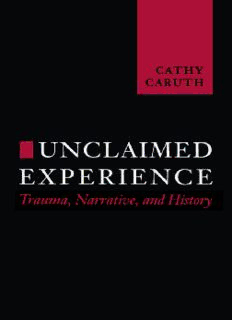
Unclaimed Experience: Trauma, Narrative and History PDF
Preview Unclaimed Experience: Trauma, Narrative and History
u n c l a i m e d e x p e r i e n c e U N C L A I M E D Cathy Caruth E X P E R I E N C E Trauma, Narrative, and History the johns hopkins university press baltimore and london © 1996The Johns Hopkins University Press All rights reserved. Published 1996 Printed in the United States of America on acid-free paper 05 04 03 02 01 00 99 98 97 96 5 4 3 2 1 The Johns Hopkins University Press 2715North Charles Street Baltimore, Maryland 21218-4319 The Johns Hopkins Press Ltd., London Library of Congress Cataloging-in-Publication Data will be found at the end of this book. A catalog record for this book is available from the British Library. isbn 0-8018-5246-3 isbn 0-8018-5247-1(pbk.) To the students of “Literature, Trauma, and Culture” This page intentionally left blank contents Acknowledgments ix Introduction: The Wound and the Voice 1 1 Unclaimed Experience: Trauma and the Possibility of History (Freud, Moses and Monotheism) 10 2 Literature and the Enactment of Memory (Duras, Resnais, Hiroshima mon amour) 25 3 Traumatic Departures: Survival and History in Freud (Beyond the Pleasure Principle, Moses and Monotheism) 57 4 The Falling Body and the Impact of Reference (de Man, Kant, Kleist) 73 5 Traumatic Awakenings (Freud, Lacan, and the Ethics of Memory) 91 Notes 113 Index 147 This page intentionally left blank acknowledgments I am grateful to Shoshana Felman for her inspiring work on tes- timony, for her astute listening, and for her deeply resonant responses to my writing. I would like to thank Geoffrey Hart- man for a rich and complex dialogue on history and represen- tation. Dori Laub, M.D., first introduced me to the world of contemporary trauma studies and has provided an ongoing dia- logue on clinical trauma research. Cynthia Chase has been a crucial interlocutor in my thinking about trauma, and Jill Rob- bins has provided central insights into the relation bet ween trauma and ethical thought. I am also grateful to Kevin New- mark for his excellent and thoughtful responses. Tom Greene has been a longtime interlocutor and has helped me to consider the literary dimensions of my study. And Harold Bloom has
Description: